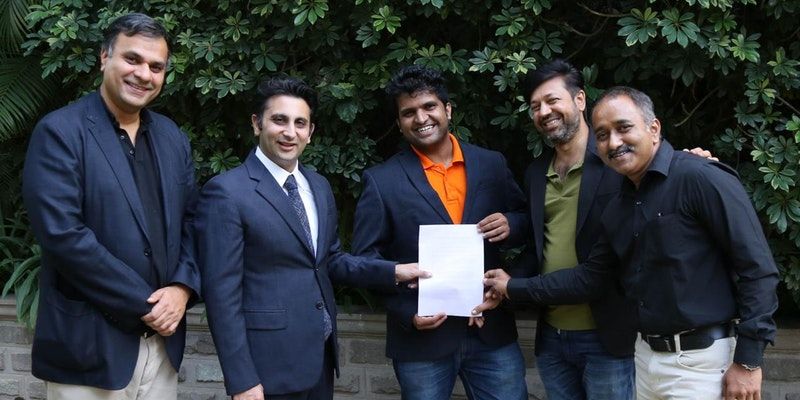How two ISB alumni and an ex-Amazon employee joined hands to build math games for children
We’ve all had a favourite teacher in school. It was usually that teacher with the capacity to engage and enthrall our attention. If there is one thing that guarantees engagement, fun and learning, it is games. It was on this very philosophy that makkajai was built.
This startup builds an end-to-end curriculum of educational games, which offer a deep gaming and educational experience. The games also contain reporting features, thereby giving parents and teachers a real-time view of the student’s progress and his or her strengths and weaknesses.
The idea first came to Roopesh Shenoy and Vinayak Palankar in 2011, when they were working on another educational startup Vagsons, which developed ERP solutions for schools and colleges. They realised that what they were working on was on the periphery of the educational system and did not address any of its core problems.

And the game begins
In 2012, Vinayak met Abhishek Awadhani when he attended ISB to do his MBA. The two of them and Roopesh soon bonded over their mutual passion for education and games. They decided to design educational games using Kinect, visiting many schools in Hyderabad for their research. However, the limitations of Kinect (capital intensive to scale, limited students engaged at one point) pushed them towards mobile games.
“In late 2013, Roopesh was able to persuade Deep Shah, our star programmer, and former code guru at Amazon, to join the project. We started analysing various games in the market and came across a lot of research, all of which proved how effective game-based learning is. Being avid gamers, we lapped all of it up. From there on, we came to our present shape and form, as we realised there aren’t enough quality educational games in the market,” says 32-year-old Abhishek.
Beating the system
Abhishek adds that the education system today across the globe is broken in many ways. Some of the key problems the team found plaguing education are:
- Non-engaging and non-interactive content: This limits student engagement and leads to lack of attention, thereby causing ineffectual learning.
- Haphazardly spread content: Parents, teachers and students have no clue what the best content is, and don’t know where to access it.
- Periodic, standardised assessments that limit timely intervention: This means learning problems are identified long after a particular topic has already been taught, limiting effectiveness of intervention.
The above problems lead to many other problems such as teachers having to spend more time on content; parents having to deal with their children kids not spending enough time on learning; and the child not learning effectively in the first place. Abhishek says,
Interactive content on tablets has the potential to solve a lot of these problems; however, there is simply not enough quality content despite a proliferation of education apps on the app stores. We believe well-designed educational games that offer a deep gaming and educational experience have a key role to play in solving many educational problems. These have the potential to engage students and impact learning in a meaningful way.
However, learning designed on educational games can only be effective if these games span the entire curriculum. makkajai is building an end-to-end curriculum comprising games that tick all the above boxes, so that students learn in a manner that is both engaging and effective. The programme starts off by covering the end-to-end curriculum for K-5 Math, followed by other subjects.
Finding newer paths
When they started in 2014, the team thought that given the number of educational apps on the app store, they could simply function as an aggregator of educational games, with an analytics back-end to identify student strengths and weaknesses.
However, when they started off by analysing the different games in the market, they found that very few were well designed, engaging and pedagogically sound. Roopesh and Deep started by reading “The Art of Game Design” by Jesse Schell and taking inspiration from the famed Number Munchers game from the Mac era. Over the next four months, they built Monster Math, the first adaptive learning math game, which covered over 40 Basic Arithmetic skills based on Common Core standards for Grades 1 – 5.
They were helped by Roopesh’s mother Shilpa, an experienced Photoshop artist, to design the games. With time and taking suggestions from kids, they developed a storyline that interested kids, put in voiceovers, and play-tested every aspect of the game with over 100 kids and teachers. James Rumfelt, a designer with experience in the US Army, whom they had met though common acquaintances, helped them design the game better.
Onboarding experts
Scaling was another challenge as the team had never put any app on the App Store before. They learned App Store Optimisation from scratch, the importance of localising a game to cater it to various audiences, and the importance of PR driving huge spikes, all from scratch.
“As a result, we have grown 30 per cent MoM, and reached close to a million downloads within a span of just over a year. We have relied completely on organic downloads as opposed to paid installs,” adds Abhishek.
They met Aditya Kolli, their pedagogy expert, when Vinayak was demoing Monster Math to a gathering of 50 educators from TFI (Teach for India). Aditya was a TFI fellow and extremely interested in educational gaming. Arti Gupta, COO, Hopscotch joined in as an advisor in marketing strategies, and Samir Bangara, CEO Qyuki Digital Media and Former MD (Digital), Disney India, advices them on scaling content.
What do the numbers say?
They launched their first game, Monster Math, in November 2014, and their second game, Monster Math 2 in December 2015. Across all games, they are close to one million downloads. Monster Math 2 received 100,000 downloads in the first month.
“Our user base has been growing at a rate of 30-35 per cent MoM. Similarly, our revenues have been growing at a rate of 30 per cent month-on-month. We have best-in-class metrics across all our apps, with one-month retention rates ranging from 40- 50 per cent, which is 4-5x the retention rates for educational apps. On average, a daily active user spends 15 minutes playing our game,” adds Abhishek. The team raised an undisclosed amount of funding from Mekin Maheshwari ex-Chief People Officer, Flipkart in 2015.
One parent, whose daughter used Monster Math says that while the latter would do well in her written and oral math tests, she wasn’t able to answer during the three second time slot while taking computer testes at school. A friend recommended the app, as it helped her daughter improve with the same issue. “So far my daughter is loving the app as it is making the math fun and not leaving her frustrated.”
The team uses paid apps as well as freemium apps with in-app purchases (content pack) to monetise. They will be transitioning to a subscription model with the launch of their next game – Number Sense.
With Number Sense, they will have an integrated pocket of content, which will ensure that all of the apps interact with each other. The games are being built in a manner that allows seamless transitioning between each other.
Moving the bar
Across the globe, the world is slowly moving away from the rote learning system to an experiential education system. This ensures retention and faster learning. It also makes learning fun. According to an IBEF report, over 70 million students will enrol in Indian high schools in less than 20 years.
There are also several players in the field. knowledgeXP is another such startup that focusses on experiential education. Another player is Bengaluru-based online-offline higher education services provider iNurture Education Solutions. There are also gamified education startups like EduIsFun, who also are into app-based education.
The global market for game-based learning is set to grow to $2.3 billion by 2017. If you include the simulation games market, then it is set to grow to $8.9 billion by 2017. The reasons for this growth is cited to be due to increasing smart phone penetration across the globe and an increasing need for different kinds of learning modules and methods.











